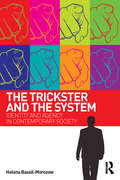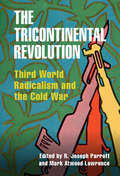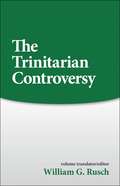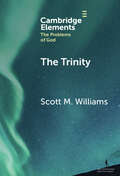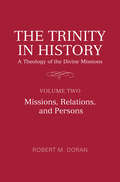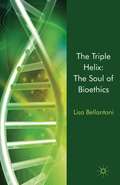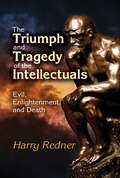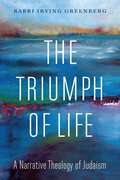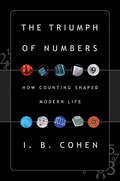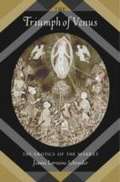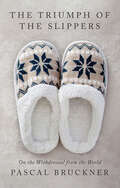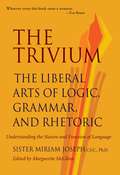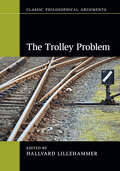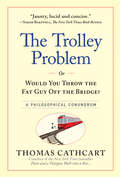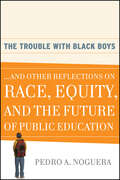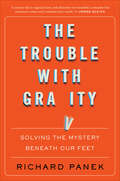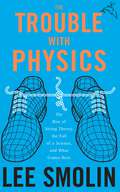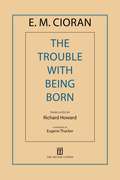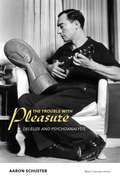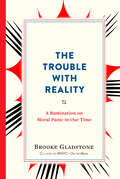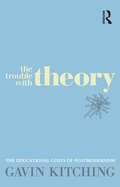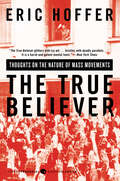- Table View
- List View
The Tribal Imagination: Civilization and the Savage Mind
by Robin FoxWe began as savages, and savagery has served us well—it got us where we are. But how do our tribal impulses, still in place and in play, fit in the highly complex, civilized world we inhabit today? This question, raised by thinkers from Freud to Levi-Strauss, is fully explored in this book by the acclaimed anthropologist Robin Fox. It takes up what he sees as the main—and urgent—task of evolutionary science: not so much to explain what we do, as to explain what we do at our peril. Ranging from incest and arranged marriage to poetry and myth to human rights and pop icons, Fox sets out to show how a variety of human behaviors reveal traces of their tribal roots, and how this evolutionary past limits our capacity for action. Among the questions he raises: How real is our notion of time? Is there a human “right” to vengeance? Are we democratic by nature? Are cultural studies and fascism cousins under the skin? Is evolutionary history coming to an end—or just getting more interesting? In his famously informative and entertaining fashion, drawing links from Volkswagens to Bartok to Woody Guthrie, from Swinburne to Seinfeld, Fox traces our ongoing struggle to maintain open societies in the face of profoundly tribal human needs—needs which, paradoxically, hold the key to our survival.
The Trickster and the System: Identity and agency in contemporary society
by Helena Bassil-MorozowFor centuries, the trickster has been used in various narratives, including mythological, literary and cinematic, to convey the idea of agency, rebellion and, often turbulent, progress. In The Trickster and the System: Identity and Agency in Contemporary Society, Helena Bassil-Morozow shows how the trickster can be seen as a metaphor to describe the psycho-anthropological concept of change, an impulse that challenges the existing order of things, a progressive force that is a-structural and anti-structural in its nature. The book is about being able to see things from an unusual, even ‘odd’, perspective, which does not coincide with the homogenous normality of the mass, or the social system, or a political ideology, or some other kind of authority. The Trickster and the System offers an analytical paradigm which can be used to examine relationships between tricksters and systems, change and stability, in a wide range of social, political and cultural contexts. It covers a range of systems, describes different types of tricksters and discusses possible conflicts, tensions and dialogues between the two opposing sides. One of the central ideas of the book is that social systems use shame as a tool to control and manage all kinds of tricksters – individuality, agency, creativity, spontaneity, innovation and initiative, to name but a few. The author argues that any society that neglects its tricksters (agents of change), ends up suffering from decay, stagnation – or even mass hysterical outbursts. The Trickster and the System: Identity and Agency in Contemporary Society provides a fresh perspective on the trickster figure in a variety of cultural contexts. It covers a range of psychological, cultural, social and political phenomena, from personal issues to the highest level of society’s functioning: self-esteem and shame, lifestyle and relationships, creativity and self-expression, media, advertising, economy, political ideology and, most importantly, human identity and authenticity. The book is essential reading for scholars in the areas of psychoanalysis, analytical psychology, myth, cultural and media studies, narrative analysis, cultural anthropology, as well as anyone interested in critical issues in contemporary culture. Helena Bassil-Morozow is a cultural philosopher, film scholar and academic writer whose many publications include Tim Burton: The Monster and the Crowd (Routledge, 2010) and The Trickster in Contemporary Film (Routledge, 2011). Helena is currently working on another Routledge project, Jungian Film Studies: the Essential Guide (co-authored with Luke Hockley). Her principal academic affiliation is the University of Bedfordshire, Faculty of Creative Arts, Technologies & Science.
The Tricontinental Revolution: Third World Radicalism and the Cold War (Cambridge Studies in US Foreign Relations)
by Mark Atwood Lawrence R. Joseph ParrottThe Tricontinental Revolution provides a major reassessment of the global rise and impact of Tricontinentalism, the militant strand of Third World solidarity that defined the 1960s and 1970s as decades of rebellion. Cold War interventions highlighted the limits of decolonization, prompting a generation of global South radicals to adopt expansive visions of self-determination. Long associated with Cuba, this anti-imperial worldview stretched far beyond the Caribbean to unite international revolutions around programs of socialism, armed revolt, economic sovereignty, and confrontational diplomacy. Linking independent nations with non-state movements from North Vietnam through South Africa to New York City, Tricontinentalism encouraged marginalized groups to mount radical challenges to the United States and the inequitable Euro-centric international system. Through eleven expert essays, this volume recenters global political debates on the priorities and ideologies of the Global South, providing a new framework, chronology, and tentative vocabulary for understanding the evolution of anti-imperial and decolonial politics.
The Trinitarian Controversy
by William G. RuschThe purpose of this series is to allow an English-reading public to gain firsthand insights into these significant times for Christianity by making available in a modern, readable English the fundamental sources which chronicle how Christianity and its theology attained their normative character. This volume explores the development of the doctrine of the Trinity in the patristic church as a result of the Arian controversy:Arius -- Letter to Eusebius of Nicomedia Arius -- Letter to Alexander of Alexandria Alexander of Alexandria -- Letter to Alexander of Thessalonica The Synodal Letter of the Council of Antioch, A. D. 325 The Creed of the Synod of Nicaea (June 19, 325) The Canons of Nicaea, A. D. 325 Eusebius of Caesarea -- Letter to His Church concerning the Synod at Nicaea Arius -- Letter to the Emperor Constantine Athanasius -- Orations against the Arians, Book 1 Gregory of Nazianzus -- Third Theological Oration concerning the Son Gregory of Nyssa -- Concerning We Should Think of Saying That There Are Not Three Gods to Ablabius Augustine of Hippo -- On the Trinity, Book 9
The Trinity (Elements in the Problems of God)
by Scott M. WilliamsThe doctrine of the Trinity, proclaimed by Christians through the Nicene-Constantinople creed, is foundational to traditional Christian belief and worship of God. But is this doctrine logically coherent? How can there be three divine persons (Father, Son, and Holy Spirit), each is God, and yet there is only one God? This is a fundamental question for philosophers, but theologians have additional questions. This Element addresses philosophical and theological issues concerning the Trinity: Hermeneutical and Logical problems, Personal Pronouns, Monarchy, Equality, the Greek vs. Latin filioque debate, Real Relations, Unity of Action, Self-Knowledge in the Trinity, and Simplicity. Based on my recent rediscovery of the sixth ecumenical council's (Constantinople III) clarifications of Trinitarian doctrine, this Element introduces Conciliar Trinitarianism and shows how it responds to the issues, including a resolution to the fundamental logical question. It also compares Conciliar Trinitarianism with Miaphysite, neo-Sabellian, Social, and other models of the Trinity.
The Trinity in History
by Robert M. Doran SJThe Trinity in History is the first volume in a new series by Robert M. Doran that uses the thought of Bernard Lonergan to develop a unified field structure for systematic work in theology. Building on his successful and thought-provoking Theology and the Dialectics of History and What Is Systematic Theology?, Doran works out a starting point for a contemporary theology of history and proposes a new application of the 'psychological analogy' for understanding the Christian doctrine of the Trinity.Advancing the work of Lonergan, Augustine, and Thomas Aquinas, The Trinity in History also enters into conversation with contemporary philosophical emphases, especially with the mimetic theory of noted anthropological philosopher René Girard. Doran suggests several refinements of Lonergan's notion of functional specialization - developing a perspective for including the data of various religious traditions in theological construction, and establishing this theory's relevance for contemporary interreligious dialogue.
The Trinity in History: Volume Two: Missions, Relations, and Persons (Lonergan Studies #2)
by Robert M. Doran, S.J.The second volume of Robert M. Doran’s magisterial The Trinity in History continues his exploration of the Trinitarian theology of Bernard Lonergan, focusing now on the notions of relations and persons and connecting the systematic proposals with the so-called "Third Quest for the Historical Jesus." Doran not only interprets Lonergan’s major work in Trinitarian theology and Christology but also suggests at least a twofold advance: a new version of the psychological analogy for understanding Trinitarian doctrine and a new starting point for the whole of systematic theology. He links these theological concerns with René Girard’s mimetic theory, proposes a theory of history based in Lonergan’s scale of values, and creates a link between exegetical and historical scholarship and systematic theology.
The Triple Helix: The Soul of Bioethics
by Lisa BellantoniLisa Bellantoni argues that contemporary bioethics divides into two logically incommensurable positions: a cult of rights, which identifies the worth of human life with our autonomy, and a cult of life, which identifies human worth with the possession of a soul, and thereby, of human dignity.
The Triumph and Tragedy of the Intellectuals: Evil, Enlightenment, and Death
by Harry RednerThis fourth instalment of Harry Redner's tetralogy on the history of civilization argues that intellectuals have a brilliant past, a dubious present, and possibly no future. He contends that the philosophers of the seventeenth century laid the ground for the intellectuals of the eighteenth century, the Age of Enlightenment. They, in turn, promoted a fundamental transformation of human consciousness: they literally intellectualized the world. The outcome was the disenchantment of the world in all its cultural dimensions: in art, religion, ethics, politics, and philosophy.In this fascinating study, Redner demonstrates how secularization took the sting out of both the dread and promise of an afterlife and intellectuals learned to die without the hope of immortality popularized by philosophy and religion. Ultimately, they produced the ideologies that generated the totalitarian regimes of the twentieth century, which subsequently exterminated these intellectuals through mass murder on a scale never before experienced. The book traces the sources of this fatal entanglement and goes on to examine the contemporary condition of intellectuals in America and the world.Wherein lies the future of the intellectuals? Redner suggest that in the present state of globalization, dominated by technocrats, experts, and professionals, their fate remains uncertain.
The Triumph of Empire
by Michael KulikowskiMichael Kulikowski takes readers into the political heart of imperial Rome, beginning with the reign of Hadrian, who visited the farthest reaches of his domain and created stable frontiers, to the decades after Constantine the Great, who overhauled the government, introduced a new state religion, and founded a second Rome.
The Triumph of Life: A Narrative Theology of Judaism
by Rabbi Irving (Yitz) GreenbergThe Triumph of Life is Rabbi Irving Greenberg&’s magnum opus—a narrative of the relationship between God and humanity as expressed in the Jewish journey through modernity, the Holocaust, the creation of Israel, and the birth of Judaism&’s next era. Greenberg describes Judaism&’s utopian vision of a world created by a God who loves life, who invites humans to live on the side of life, and who enables the forces of life to triumph over death. The Bible proclaims our mission of tikkun olam, repairing the world, such that every human image of God is sustained in the fullness of our dignity. To achieve this ideal, Judaism offers the method of covenant—a realistic, personal, incremental partnership between God and humanity across generations in which human beings grow ever more responsible for world repair. Greenberg calls on us to redirect humanity&’s unprecedented power in modernity to overcome poverty, oppression, inequality, sickness, and war. The work of covenant requires an ethic of power—one that advances life collaboratively and at a human pace—so that the Jewish people and all humanity can bring the world toward the triumph of life.
The Triumph of Numbers: How Counting Shaped Modern Life
by I. Bernard CohenFrom the pyramids to mortality tables, Galileo to Florence Nightingale, a vibrant history of numbers and the birth of statistics. The great historian of science I. B. Cohen explores how numbers have come to assume a leading role in science, in the operations and structure of government, in marketing, and in many other aspects of daily life. Consulting and collecting numbers has been a feature of human affairs since antiquity--taxes, head counts for military service--but not until the Scientific Revolution in the twelfth century did social numbers such as births, deaths, and marriages begin to be analyzed. Cohen shines a new light on familiar figures such as Thomas Jefferson, Benjamin Franklin, and Charles Dickens; and he reveals Florence Nightingale to be a passionate statistician. Cohen has left us with an engaging and accessible history of numbers, an appreciation of the essential nature of statistics.
The Triumph of Venus: The Erotics of the Market
by Jeanne Lorraine SchroederIn this ambitious and innovative work, Professor Schroeder applies Hegelian philosophy and Lacanian psychoanalysis, as well as classical mythologies, to argue for a reinterpretation of our understanding of economic markets.
The Triumph of the Slippers: On the Withdrawal from the World
by Pascal BrucknerSince the beginning of the 21st century, global warming, terrorism, the pandemic and now the war in Ukraine have created a widespread feeling that the world is an increasingly dangerous place. In response to this situation, it is understandable that many people are inclined to retreat to the safety of their home – the last refuge and safeguard against the savagery of the outside world. But the home is not just a shelter: it is a space that supplants and replaces the world, a wired cocoon that gradually renders any journey to the outside world superfluous. From our couch, we can enjoy remotely the pleasures once offered by the cinema, the theatre and the café. Everything, from food to love to art, can be delivered to your door. Armed with a smartphone and a Netflix account, why would anyone risk life and limb to venture out to the cinema? Compulsory confinement, the nightmare of the pandemic years, seems to have been replaced by voluntary self-confinement. Fleeing from the cities, working remotely, relinquishing travel and tourism, we risk becoming reclusive creatures that cower at the slightest tremor. In this witty and spirited book, Pascal Bruckner takes aim at today’s voluntary seclusionism and the self-inflicted atrophy that comes with it, tracing its philosophical contours and historical roots. It is no longer the tyranny of lockdowns that threatens us but rather the tyranny of the sofa: will the slipper and the dressing gown be the new symbols of tomorrow's world?
The Trivium: The Liberal Arts of Logic, Grammar, and Rhetoric
by Sister Miriam Joseph Marguerite McGlinnWho sets language policy today? Who made whom the grammar doctor? Lacking the equivalent of l'Académie française, we English speakers must find our own way looking for guidance or vindication in source after source. McGuffey's Readers introduced nineteenth-century students to "correct" English. Strunk and White's Elements of Style and William Safire's column, "On Language," provide help on diction and syntax to contemporary writers and speakers. Sister Miriam Joseph's book, The Trivium: The Liberal Arts of Logic, Grammar, and Rhetoric, invites the reader into a deeper understanding—one that includes rules, definitions, and guidelines, but whose ultimate end is to transform the reader into a liberal artist. A liberal artist seeks the perfection of the human faculties. The liberal artist begins with the language arts, the trivium, which is the basis of all learning because it teaches the tools for reading, writing, speaking, and listening. Thinking underlies all these activities. Many readers will recognize elements of this book: parts of speech, syntax, propositions, syllogisms, enthymemes, logical fallacies, scientific method, figures of speech, rhetorical technique, and poetics. The Trivium, however, presents these elements within a philosophy of language that connects thought, expression, and reality. "Trivium" means the crossroads where the three branches of language meet. In the Middle Ages and the Renaissance, students studied and mastered this integrated view of language. Regrettably, modern language teaching keeps the parts without the vision of the whole. Inspired by the possibility of helping students "acquire mastery over the tools of learning" Sister Miriam Joseph and other teachers at Saint Mary's College designed and taught a course on the trivium for all first year students. The Trivium resulted from that noble endeavor. The liberal artist travels in good company. Sister Miriam Joseph frequently cites passages from William Shakespeare, John Milton, Plato, the Bible, Homer, and other great writers. The Paul Dry Books edition of The Trivium provides new graphics and notes to make the book accessible to today's readers. Sister Miriam Joseph told her first audience that "the function of the trivium is the training of the mind for the study of matter and spirit, which constitute the sum of reality. The fruit of education is culture, which Mathew Arnold defined as 'the knowledge of ourselves and the world.'" May this noble endeavor lead many to that end.
The Trolley Problem (Classic Philosophical Arguments)
by Hallvard LillehammerThe Trolley Problem is one of the most intensively discussed and controversial puzzles in contemporary moral philosophy. Over the last half-century, it has also become something of a cultural phenomenon, having been the subject of scientific experiments, online polls, television programs, computer games, and several popular books. This volume offers newly written chapters on a range of topics including the formulation of the Trolley Problem and its standard variations; the evaluation of different forms of moral theory; the neuroscience and social psychology of moral behavior; and the application of thought experiments to moral dilemmas in real life. The chapters are written by leading experts on moral theory, applied philosophy, neuroscience, and social psychology, and include several authors who have set the terms of the ongoing debates. The volume will be valuable for students and scholars working on any aspect of the Trolley Problem and its intellectual significance.
The Trolley Problem, or Would You Throw the Fat Guy Off the Bridge?: A Philosophical Conundrum
by Thomas CathcartA trolley is careering out of control. Up ahead are five workers; on a spur to the right stands a lone individual. You, a bystander, happen to be standing next to a switch that could divert the trolley, which would save the five, but sacrifice the one—do you pull it? Or say you’re watching from an overpass. The only way to save the workers is to drop a heavy object in the trolley’s path. And you’re standing next to a really fat man….This ethical conundrum—based on British philosopher Philippa Foot’s 1967 thought experiment—has inspired decades of lively argument around the world. Now Thomas Cathcart, coauthor of the New York Times bestseller Plato and a Platypus Walk into a Bar, brings his sharp intelligence, quirky humor, and gift for popularizing serious ideas to “the trolley problem.” Framing the issue as a possible crime that is to be tried in the Court of Public Opinion, Cathcart explores philosophy and ethics, intuition and logic. Along the way he makes connections to the Utilitarianism of Jeremy Bentham, Kant’s limits of reason, St. Thomas Aquinas’s fascinating Principle of Double Effect, and more.Read with an open mind, this provocative book will challenge your deepest held notions of right and wrong. Would you divert the trolley? Kill one to save five? Would you throw the fat man off the bridge?
The Trouble With Black Boys
by Pedro A. NogueraFor many years to come, race will continue to be a source of controversy and conflict in American society. For many of us it will continue to shape where we live, pray, go to school, and socialize. We cannot simply wish away the existence of race or racism, but we can take steps to lessen the ways in which the categories trap and confine us. Educators, who should be committed to helping young people realize their intellectual potential as they make their way toward adulthood, have a responsibility to help them find ways to expand identities related to race so that they can experience the fullest possibility of all that they may become. In this brutally honest--yet ultimately hopeful-- book Pedro Noguera examines the many facets of race in schools and society and reveals what it will take to improve outcomes for all students. From achievement gaps to immigration, Noguera offers a rich and compelling picture of a complex issue that affects all of us.
The Trouble With Gravity: Solving the Mystery Beneath Our Feet
by Richard PanekWhat is gravity? Nobody knows—and just about nobody knows that nobody knows. How something so pervasive can also be so mysterious, and how that mystery can be so wholly unrecognized outside the field of physics, is one of the greatest conundrums in modern science. But as award-winning author Richard Panek shows in this groundbreaking, mind-bending book, gravity is a cold case that&’s beginning to heat up. In The Trouble with Gravity, Panek invites the reader to experience this ubiquitous yet elusive force in a breathtakingly new way. Gravity, Panek explains, structures not only our bodies and our physical world, but also our minds and culture. From our very beginnings, humans&’ conceptions of gravity have been inextricably bound to our understanding of existence itself. As we get closer and closer to solving the riddle of gravity, it is not only physics that is becoming clearer. We are also getting to know ourselves as never before.
The Trouble With Physics: The Rise of String Theory, The Fall of a Science, and What Comes Next
by Lee SmolinIn this illuminating book, the renowned theoretical physicist Lee Smolin argues that fundamental physics -- the search for the laws of nature -- losing its way. Ambitious ideas about extra dimensions, exotic particles, multiple universes, and strings have captured the public’s imagination -- and the imagination of experts. But these ideas have not been tested experimentally, and some, like string theory, seem to offer no possibility of being tested. Yet these speculations dominate the field, attracting the best talent and much of the funding and creating a climate in which emerging physicists are often penalized for pursuing other avenues. As Smolin points out, the situation threatens to impede the very progress of science. With clarity, passion, and authority, Smolin offers an unblinking assessment of the troubles that face modern physics -- and an encouraging view of where the search for the next big idea may lead.
The Trouble with Being Born (Quartet Encounters Ser.)
by E. CioranIn this volume, which reaffirms the uncompromising brilliance of his mind, Cioran strips the human condition down to its most basic components, birth and death, suggesting that disaster lies not in the prospect of death but in the fact of birth, "that laughable accident." In the lucid, aphoristic style that characterizes his work, Cioran writes of time and death, God and religion, suicide and suffering, and the temptation to silence. Through sharp observation and patient contemplation, Cioran cuts to the heart of the human experience.
The Trouble with Pleasure: Deleuze and Psychoanalysis (Short Circuits)
by Aaron SchusterAn investigation into the strange and troublesome relationship to pleasure that defines the human being, drawing on the disparate perspectives of Deleuze and Lacan. Is pleasure a rotten idea, mired in negativity and lack, which should be abandoned in favor of a new concept of desire? Or is desire itself fundamentally a matter of lack, absence, and loss? This is one of the crucial issues dividing the work of Gilles Deleuze and Jacques Lacan, two of the most formidable figures of postwar French thought. Though the encounter with psychoanalysis deeply marked Deleuze's work, we are yet to have a critical account of the very different postures he adopted toward psychoanalysis, and especially Lacanian theory, throughout his career. In The Trouble with Pleasure, Aaron Schuster tackles this tangled relationship head on. The result is neither a Lacanian reading of Deleuze nor a Deleuzian reading of Lacan but rather a systematic and comparative analysis that identifies concerns common to both thinkers and their ultimately incompatible ways of addressing them. Schuster focuses on drive and desire—the strange, convoluted relationship of human beings to the forces that move them from within—“the trouble with pleasure." Along the way, Schuster offers his own engaging and surprising conceptual analyses and inventive examples. In the “Critique of Pure Complaint” he provides a philosophy of complaining, ranging from Freud's theory of neurosis to Spinoza's intellectual complaint of God and the Deleuzian great complaint. Schuster goes on to elaborate, among other things, a theory of love as “mutually compatible symptoms”; an original philosophical history of pleasure, including a hypothetical Heideggerian treatise and a Platonic theory of true pleasure; and an exploration of the 1920s “literature of the death drive,” including Thomas Mann, Italo Svevo, and Blaise Cendrars.
The Trouble with Reality: A Rumination on Moral Panic in Our Time
by Brooke GladstoneEvery week on the public radio show On the Media, the award-winning journalist Brooke Gladstone analyzes the media and how it shapes our perceptions of the world. Now, from her front-row perch on the day’s events, Gladstone brings her genius for making insightful, unexpected connections to help us understand what she calls—and what so many of us can acknowledge having—“trouble with reality.” Reality, as she shows us, was never what we thought it was—there is always a bubble, people are always subjective and prey to stereotypes. And that makes reality actually more vulnerable than we ever thought. Enter Donald J. Trump and his team of advisors. For them, as she writes, lying is the point. The more blatant the lie, the easier it is to hijack reality and assert power over the truth. Drawing on writers as diverse as Hannah Arendt, Walter Lippmann, Philip K. Dick, and Jonathan Swift, she dissects this strategy, straight out of the authoritarian playbook, and shows how the Trump team mastered it, down to the five types of tweets that Trump uses to distort our notions of what’s real and what’s not. And she offers hope. There is meaningful action, a time-tested treatment for moral panic. And there is also the inevitable reckoning. History tells us we can count on it. Brief and bracing, The Trouble with Reality shows exactly why so many of us didn’t see it coming, and how we can recover both our belief in reality—and our sanity.
The Trouble with Theory: The educational costs of postmodernism
by Gavin KitchingPostmodern theory has engaged the hearts and heads of the brightest students because of its apparent political and social radicalism. Despite this Professor Gavin Kitching claims that, 'At the heart of postmodernism is very poor, deeply confused and misbegotten philosophy. As a result even the very best students who fall under its sway produce radically incoherent ideas about language, meaning, truth and reality.'This is not another conservative attack on postmodernism. Rather, it is a carefully considered analysis from a dedicated university teacher who is convinced that we have gone terribly astray. He shows that postmodern theory is at best irrelevant to, and at worst undermining of, persuasive political arguments, and reveals the basic philosophical confusion at its heart which makes this so. Essential reading for any student writing a thesis in the humanities and the social sciences, and for their teachers.'It is the strongest and best attack on the ravages of routine post-modernism that I have ever read. I applaud the way he lists the good causes that students warmly espouse, and then suggests a simpler way to support them without the self-destructive it's all just language that is implicit in their work.' - Professor Sir Bernard Crick, Emeritus Professor of Politics, Birkbeck College, University of London'Gavin Kitching rattles the cages. Will the inmates hear this? They should, if only for the reason that there is virtue in learning to argue against yourself. This is a serious book.' - Professor Peter Beilharz, Sociology, La Trobe University'Required reading for anyone who wants to understand how and why postmodernism has had such disastrous pedagogical consequences.' - Professor David G. Stern, Philosophy, University of Iowa
The True Believer: Thoughts on the Nature of Mass Movements
by Eric HofferA stevedore on the San Francisco docks in the 1940s, Eric Hoffer wrote philosophical treatises in his spare time while living in the railroad yards. The True Believer -- the first and most famous of his books -- was made into a bestseller when President Eisenhower cited it during one of the earliest television press conferences.Completely relevant and essential for understanding the world today, The True Believer is a visionary, highly provocative look into the mind of the fanatic and a penetrating study of how an individual becomes one.

